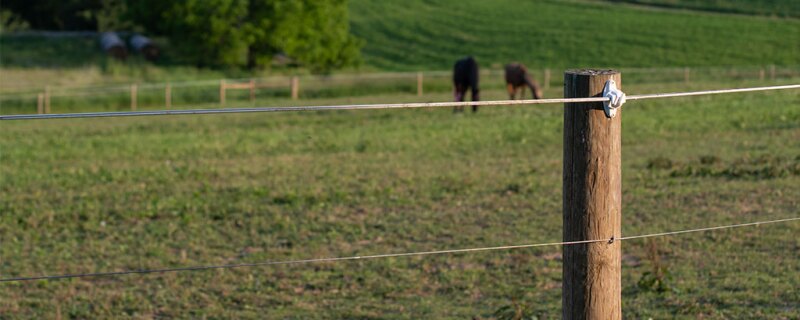Farmers have always had problems keeping livestock on their property. The invention of barbed wire in 1800 helped them considerably however, since the development of electronics, farmers discovered that smooth or barbed wire could be made more effective by utilizing electric shock to control animals.
This was the beginning of the electric fence as the common form of fencing on most farms. However, it can be a hazard unless the controller limits the current to a safe value. Improper fence controllers have been responsible for forest, field, and farm fires, as well as injury and even death to animals.
The controller is responsible for the nature of the shock, and it must be built in such a way to actually control the maximum current and duration of current flow through the fence. To be a safe unit, it must keep these factors within certain limits. The maximum duration of current flow in an approved controller does not exceed one-tenth of a second. Laws have been enacted to regulate the use of electric fence controllers with safety in mind.
The safe controller bears the Underwriters Laboratory seal of approval. It also meets all UL requirements and state codes, yet delivers adequate electrical shocking power to hold livestock.
The unsafe controller, commonly called the “weed burner,” is dangerous and has caused fire losses. Approximately 750 forest fires have been caused by electric fencers in recent years.
Can an electric fence start a fire?
Yes, electric fences can start fires. The most common reason they start fires is from using “continuous current.” When this energizer is combined with the vegetation, it can ignite a large fire.
Why do weed burners cause forest fires?
Controllers of this type operate with an electrical charge of sufficient duration to cause combustible material in contact with the fence to ignite under certain conditions. They are specifically designed to burn weeds and are so-named. The weed burner type permits energizing the fence for periods up to one full second or more. This type of controller is sold under the pretense of being a convenience to the farmer on fence-line weed elimination. In fact, it does not eliminate weeds and is a very bad fire risk. Under ideal conditions, a weed burner may go several years without causing a problem, but the potential for starting a new fire still exists.
Electric fence regulations
NR 30.08 Electric fence controllers. (1) In all areas outside the limits of incorporated villages and cities, during any time of the year except when the ground is snow covered, it shall be unlawful to use or operate any electric fence controller that does not bear an Underwriters Laboratory seal of approval, or to use or operate an electric fence controller that does not comply with Wisconsin Administrative Code, Chapter Ind. 16.
Many fence controllers operate near farm buildings. Some insurance companies restrict or deny coverage due to the use of unapproved electric fence controllers.
Hints on proper fence installation
- Use only UL-approved controllers and follow all instructions from the manufacturer.
- Make sure controller is well-grounded.
- Use good, clean wire
- Use good, clean insulators.
- Keep fence free of brush, weeds, and grass.
If these common-sense rules are followed and an approved controller is used, your electric fence can be effective and safe.
Liability for forest fires
Forest fires caused by the operation of an electric fence subjects you to payment of fire suppression costs, damages, and penalities.
For further information, contact your SECURA Risk Management Consultant.




